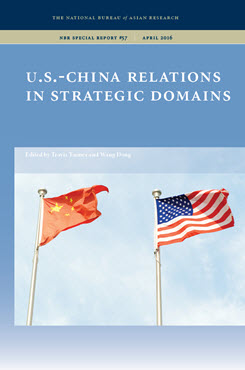U.S.-China Relations in the Maritime Security Domain
This essay examines the importance of the maritime domain to U.S. and Chinese national interests, discusses issues on which the two powers’ interests diverge, identifies areas for cooperation, and proposes potential mechanisms to manage maritime tensions.
EXECUTIVE SUMMARY
MAIN ARGUMENT
The maritime domain is the most mature environment in which China and the U.S. interact and is an area where the two major powers repeatedly discuss key issues of contention and cooperation. Yet while this makes conceptualization of areas of agreement and disagreement easier than in other domains, the enormous interests involved and the potential for the two powers to confound one another make the task of arriving at cooperative measures no less daunting. Both countries have an interest in freedom of navigation, both recognize the tangible benefits from maritime-related economies, both have a vested interest in good order and stability at sea, and both view the sea as a means to foster and protect national security interests. At the same time, the two countries differ in how they define their respective national interests, what they believe to be appropriate means of displaying good and bad intentions, how they view the sea (either as a threat or an opportunity), and how they interpret international law and the protection of maritime sovereignty. Yet despite these differences, the U.S. and China share enough overlapping interests in the maritime domain to warrant serious thought about deepening and strengthening cooperative programs already in existence.
POLICY IMPLICATIONS
- The U.S. and China should build on existing cooperative activities between their respective coast guards, while sustaining and, if possible, extending cooperation between other government agencies related to anti-pollution measures, ocean observation, marine scientific research, and prevention of marine hazards.
- U.S. and Chinese efforts in the Gulf of Aden and the Indian Ocean to combat piracy are not presently coordinated. One ambitious option the two sides should consider is forming a quintilateral combined search and rescue agency (made up of the U.S., China, India, Australia, and ASEAN) to monitor the Indian Ocean region, detect and respond to crises, and provide rescue efforts for ships and aircraft transiting these waters.
- The two powers could expand on the military-to-military cooperation that has taken place within the maritime domain over the past few years. The Rim of the Pacific (RIMPAC) exercise should continue to serve as a platform for Chinese participation. Additionally, the U.S. should consider inviting China to exercises farther west, such as the Cooperation Afloat Readiness and Training (CARAT) exercise that it conducts annually with the Southeast Asian militaries.
Christopher Yung is the Donald Bren Chair of Non-Western Strategic Thought at the U.S. Marine Corps University.
Wang Dong is an Associate Professor in the School of International Studies at Peking University.


